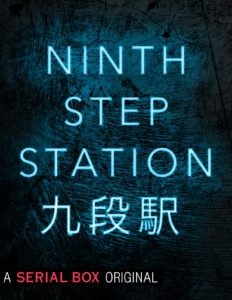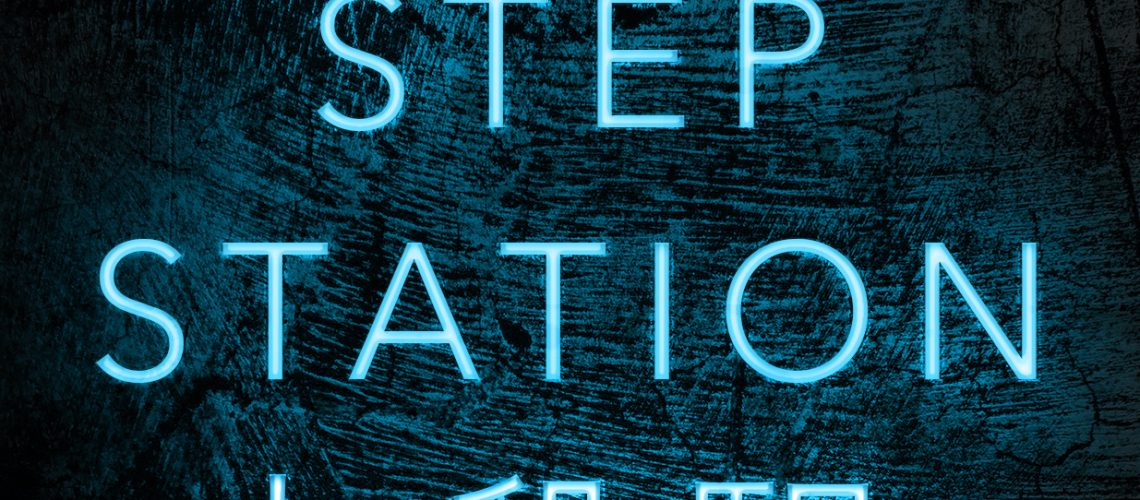Ninth Step Station is an excellent collaborative effort which entertains and asks hard questions about crime, investigation, surveillance, and the future of technology in a well imagined near future setting.
The locale is Tokyo in the 2030s. After an attack by China on Japan, much of Japan is under Chinese occupation, and half of Tokyo is held by them as well, with a border zone between occupied Japan and free Japan managed by ASEAN, led by the United States. Tensions are high in this divided Tokyo of the future. The peace seems fragile and ready to erupt at any moment, forces scheme to survive and thrive, and the day to day life of people on both sides of the divide is under constant stress.

And even within all of this stress and distress, drone-enforced borders, body modifications, resistance movements mean that the local police forces, under strain at the best of times, need outside help. And so a UN Peacekeeper finds herself paired with a local police officer to team up, solve crimes, and try and keep a lid on the troubles that plague divided Tokyo. A series of murders and crimes, however, may strain now only their budding professional relationship, but plunge the city into all-out war.
This is the world of Ninth Step Station, created for Serial Box by Malka Older, Fran Wilde, Curtis Chen and Jacqueline Koyanagi.
The serial rides strongly on the strength of the “Wunza” relationship between the two principals. While there is a gallery of secondary characters who circle around and interact with them, the serial, throughout all the episodes, relies and leans strongly on the relationship between Detective Miyako Koreda of the Tokyo Metropolitan Police and Lt. Emma Higashi, the UN Peacekeeper who has been seconded to the titular Ninth Step Station and partnered with Miyako. Their relationship starts off very uneasy, and evolves, changes, and grows over the course of the episodes. The local knowledge of Miyako and the technological know-how and skills of Emma make them a formidable team, but they both have personal agendas, hopes, fears and directives that complicate their working relationship in interesting ways. Their interactions with the people around them and in their personal circles, including some revelations regarding them, only makes the character map of the serial richer and deeper.
The technology is the highlight of the worldbuilding. From drones, to body modifications, advanced forensics and the well thought-out consequences of the Chinese invasion, Tokyo of the 2030s is a place built by the creators for drama on several levels. The technology provides the shiniest and most obvious hooks for readers to sink into the SFnal aspects of the setting. Who needs a real wall when sets of drones and sensors can do the job nearly as well and much more cheaply? The advanced forensics and body mods, as well as new reasons and ways to commit crimes, give the Noir aspects of the work, the mean streets of divided Tokyo, new and fresh intersections for the police to have to deal with. There are plenty of jangly hooks and aspects for the characters to bounce off of.
But what I really liked best was the idea of divided Tokyo itself. On levels that are both above and below the police, ranging from organized crime to geopolitics, a divided Tokyo of the near future lets the authors play with some Cold War tropes that have not been in play since the days of divided Berlin. The Chinese, the Americans and the Japanese caught on both sides provide an environment that adds political and social dimensions to crime and investigations thereof. The worldbuilding works very well in updating the Cold War tropes of a divided city in a powder-keg environment with near-future technology and concerns to provide an environment for drama.
And that is the heart of the stories and episodes: the drama that erupts from this environment and the characters that inhabit it. We get a series of investigations and events that draw our protagonists into a crime, usually violent, to solve. There is a buildup of events and prior investigations that inexorably comes to a head, with a finale that capstones all of the investigations that come before. It’s excellently entertaining, and draws the reader not only through each episode, but whets the appetite for subsequent episodes. The questions of surveillance, the use of technology for that and the intersections of privacy, government, freedom and security in a world and milieu in a pressure cooker even more intense than ours points back to ask questions about our own society today, in the best traditions of science fiction. Ninth Step Station is a compulsively readable and excellent serial.







